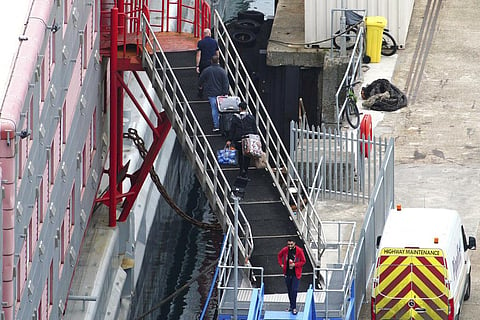

LONDON: Britain’s government on Monday rejected claims that it had been slow to evacuate asylum-seekers from a barge moored off the south coast of England once traces of the bacteria that causes Legionnaire’s disease were found in the ship’s water system.
In the latest critique of the government’s ballyhooed efforts to control migration and reduce the cost of housing a rising number of asylum-seekers, local health officials said over the weekend that the barge operator was told about the bacteria last Monday — the day before asylum-seekers were moved onto the Bibby Stockholm.
But Health Secretary Steve Barclay said ministers weren’t informed about the bacteria until Thursday and they took “very quick action.” The Home Office, the central government department that oversees migration, moved all 39 men who were being housed on the ship into other accommodation on Friday.
Questions about the government’s response to the bacteria issue came after immigration dominated the weekend news, with a surge of migrants crossing the English Channel in small boats during a period of good weather and at least six people dying when one boat sank off the coast of France. More than 1,600 people arrived in England on 30 boats from Aug. 10-12, the government said Monday.
Prime Minister Rishi Sunak has made stopping the boats a key goal as he looks for issues that will bolster voter support for his Conservative Party, which is trailing badly in opinion polls, ahead of a general election that is expected to take place next year.
Part of that strategy is a plan to move asylum-seekers from hotel accommodation onto barges and disused military bases to make it less attractive for people to come to the U.K. and to cut the cost of housing those who seek shelter in Britain. Sunak also wants to deport people who enter the country illegally to Rwanda, though that plan has been stalled by court challenges.
The British government says it is spending about 6 million pounds ($7.6 million) a day on hotel rooms for 51,000 asylum-seekers. The number of people requesting asylum in Britain jumped to more than 167,000 at the end of last year, from about 45,000 in 2018, according to the UN refugee agency.
Ultimately the government hopes to house up to 500 adult men on the Bibby Stockholm.
Legionnaires’ disease is a serious respiratory infection caused when people inhale tiny water droplets containing the bacteria. It is not transmitted person-to-person, but is found in the cooling systems of large buildings and water lines that aren’t in regular use. While symptoms are similar to the flu, Legionnaires’ disease can be treated with antibiotics.
The finger-pointing surrounding the bacteria is just the latest setback for the plan to move asylum-seekers onto the Bibby Stockholm. Fire officials previously raised concerns about safety precautions on the barge and migrant rights advocates questioned whether it was appropriate to house people fleeing war and persecution in such cramped conditions.